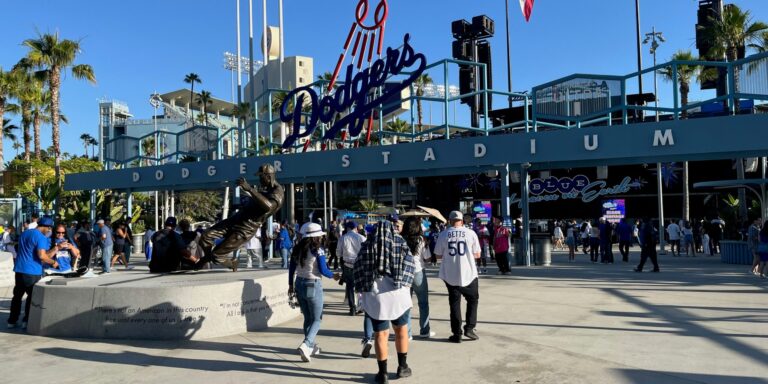On June 19, the Los Angeles Dodgers made national headlines after confirming they had denied entry to federal immigration agents who reportedly attempted to access Dodger Stadium during one of the team’s marquee home games. According to a statement released by the team that evening, the move was intended to maintain a “safe and welcoming environment for all fans,” while avoiding any disruptions that could arise from the presence of enforcement personnel. The team emphasized that the decision aligned with their policies regarding non-emergency law enforcement access to stadium property.
While the Dodgers referred to the agents as representatives of U.S. Immigration and Customs Enforcement (ICE), the Department of Homeland Security (DHS) issued a public rebuttal. A DHS spokesperson stated that no ICE personnel were present at the stadium and that a lone Customs and Border Protection (CBP) vehicle had briefly entered the area for unrelated reasons. Despite the federal agency’s clarification, the Dodgers stood by their account, and the incident quickly evolved into a broader reflection of California’s tense relationship with federal immigration enforcement.
The timing of the confrontation was significant. Over the past several weeks, ICE and CBP operations have intensified in the Los Angeles region, triggering protests, legal action, and condemnation from local and state officials. Many neighborhoods in the city have reported sightings of unmarked vehicles and plainclothes agents, heightening fears among immigrant families and prompting calls for accountability. California Governor Gavin Newsom and Los Angeles Mayor Karen Bass have both spoken out against the raids, accusing federal authorities of stoking fear and undermining public trust.
California’s sanctuary state policies, which limit local cooperation with federal immigration enforcement unless a judicial warrant is presented, have long positioned the state in opposition to aggressive federal actions. The situation at Dodger Stadium further highlighted the legal autonomy of private institutions in this landscape. Legal experts noted that the Dodgers were fully within their rights to deny entry. Under federal guidelines, agents must possess a judicial warrant—distinct from an administrative ICE warrant—to access private property such as stadium parking lots or internal facilities.
The Dodgers’ decision to block entry marked a rare moment of political engagement for the organization, which typically refrains from public involvement in contentious social issues. However, the team’s deep cultural ties to Los Angeles’ immigrant and Latino communities likely played a role. For decades, Dodger Stadium has served as a unifying venue in a diverse and politically active city. Fans and community members responded to the June 19 decision with widespread support, viewing it as a symbolic gesture of solidarity during a time of uncertainty.
Player responses also helped shape public perception of the incident. Utility player Kiké Hernández spoke candidly following the game, expressing empathy for families affected by recent immigration enforcement actions. “We play for all of L.A.,” he said, “and that means standing with families who are scared right now.” His remarks earned applause from fans and resonated with many who see athletes not only as entertainers, but also as voices of moral leadership in the community.
Other professional sports franchises in Los Angeles echoed the sentiment. Both LAFC and Angel City FC released statements reaffirming their commitment to inclusivity and to creating safe environments for fans, regardless of their immigration status. These responses underscore a growing trend in which sports organizations are increasingly seen as community institutions with a responsibility to speak up during times of social tension.
The Dodgers have hinted at further actions to support vulnerable communities, though no formal initiatives have been announced. Team officials suggested that partnerships with legal aid groups and community organizations may soon be explored, aiming to provide tangible support beyond symbolic gestures. Such efforts would further integrate the team into Los Angeles’ broader civic fabric at a time when federal-local tensions are once again on the rise.
The June 19 incident not only highlights a legal boundary over federal authority on private property, but also represents a cultural turning point. As immigration enforcement activities continue and local opposition builds, institutions like the Dodgers may increasingly be expected to take public stances that reflect the values of the communities they serve.
For many, the Dodgers’ decision was not just a logistical move—it was a message. In a time when fear and division threaten to spill into everyday spaces, the team made clear that its stadium will remain a place of safety, unity, and community. On that evening, defending home field meant more than winning the game—it meant standing with the city.



